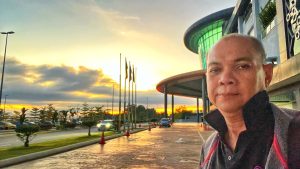From Operating Table to Intentional Leading: A Spiritual Reflection on Self-Leadership
Through struggle, ritual, connection, and renewed purpose: A leadership path rooted in Quranic wisdom and personal awakening.

Photo: Sunrise at hospital, post-surgery during appointment for speech therapy
Bismillah (With the name of Allah).
On 24 March 2025, I went through major heart surgery. I don’t consider it a health scare. Rather, it was a wake up call. It became a turning point.
In the weeks that followed, my healing was not only physically painful, it also pierced my faith, my mindset, my heartset, and my relationships. I shared my personal lessons in an hour-long video called THE BYPASS FILES: Hasan’s Lessons From His Surgery
– see vimeo.com/hasansaidin/bypassfiles
Drawing from the personal breakdowns and breakthroughs from the bypass experience, further reflection allowed me to translate what I learned into self-leadership. I structured here these learnings around five pillars, and came up with the 5-R Pillars of Self-Leadership.
Each pillar is drawn from the rawness of my surgery experience and inspired by Islamic principles.
If you’ve been through a disruptive tribulation, be it by illness, burnout, grief, or sheer exhaustion, I hope these words find you where you are.
1st R. Realize Mortality
“Every soul shall taste death…” — Quran, Surah Al-Imran (3:185)
Before surgery, I was active, energetic and unaware of the blockages in my physical heart. No symptoms. The stress test results shocked me and also shocked the people I know. Within weeks, I was in the operating theatre, undergoing triple bypass surgery.
Two close friends had passed away two months before my surgery. One had a heart attack and didn’t survive. The other had a failed bypass surgery.
Post-op in CICU (Cardiothoracic Intensive Care Unit) I had a near-death experience.
I was spared.
It made me confront a difficult yet liberating reality: I am mortal, and I don’t control the clock.
This realization exploded into clarity. What truly matters? What am I really here for?
Self-leadership begins by remembering the end. Mortality isn’t morbid, it’s motivational. Leaders must see time as amanah, a trust we will account for.
Let that guide how we live, lead, and love.
In my coaching, I now need to help clients see this moment not as a threat, but a call to action. What would you do differently if you knew your time was limited?
Realizing mortality clarifies priorities, strengthens purpose, and shifts leadership from performance to amanah: the sacred trust of time, health (physical or otherwise), and influence.
2nd R. Ritualize Recovery
“Take advantage of five before five…” — Hadith, Hakim
Especially in the first two months, recovery was arduous, slow and demoralizing. The body was “wrecked,” so needed to rebuild itself.
Healing wasn’t automatic. I had to build rituals: listening to ruqyah (faith healing) recitations, walking mindfully, spending quiet time with my wife (listening to the chirping birds while having breakfast on the balcony) and watching Star Trek (yes, really).
These became my anchors.
Recovery must be ritualized. The Prophet ﷺ structured his day, in worship, service, and rest. We too must honour rhythm.
Leadership recovery isn’t laziness. It’s discipline. It’s shukr (gratitude) in motion.
Create routines that restore your soul. And keep them, even after you heal.
This pillar encourages leaders to embrace daily, intentional rituals that support healing and sustainability. Whether in recovery from illness or burnout, rituals are not indulgence. More so, they’re systems of barakah (divine amplification of blessings).
In my coaching, I am reinforcing my help to leaders to craft their own structures of shukr and tawakkul (trust in God), translating into daily habits that become scaffolding for emotional, spiritual, and physical resilience. Recovery is worship when done with intention.
3rd R. Reach for Connection
“The believers are like one body…” — Hadith, Bukhari & Muslim
I did not heal alone.
My wife, Marsila, was constant. She forsook everything for me. She was my super nurse.
My children and other extended family members stepped in with warmth and care. Friends I hadn’t seen in 10 years showed up. Clients dropped by and regularly checked in with me for updates. Acquaintances (social media friends and connections) sent well wishes.
I realized how deeply I was being carried by their du’a (prayers or supplications), messages, and physical presence. I didn’t recover alone, I was lifted. I counted: not by dozens of them, but hundreds.
They reminded me: “You matter. You’re not alone.”
And I saw, perhaps more clearly than ever, how leadership too must be rooted in connection.
We often imagine leadership as lonely. It shouldn’t be.
Connection is more than a bonus. It’s the oxygen of leadership. Relationships strengthen our heart, literally and figuratively.
Leadership is not built on isolation, but on ukhuwah (brotherhood or fraternity) and silaturrahim (strengthening or maintaining relationships, within family and community). This pillar invites leaders to reach out, not just for support, but to give it, too.
In my coaching, all the more I’d like to help clients examine the strength of their relationships, both professional and personal, and build the emotional muscle to attract for help or to ask for help. Leadership grounded in connection is not weaker, it is stronger.
Healing flows where hearts are linked.
4th R. Reframe Struggle
“Indeed, with hardship, there is ease.” — Quran, Surah Al-Inshirah (94:6)
Struggle isn’t the opposite of ease. It is the path to it.
Post-op, my body and soul were devoid of energy and my emotions were raw. I felt almost helpless. But over time, I saw that pain was not punishment. It was transformation.
I began to see that each small difficulty was a sign of progress. The soreness meant healing. The tiredness meant my heart was working anew. I cried, not out of despair, but out of awe at being alive. Even in struggle, Allah was teaching me. I began to journal, reflect, and slowly, I stopped seeing struggle as a tribulation. It became a teacher.
Islam doesn’t glorify suffering, but it gives it meaning.
In self-leadership, we teach resilience not by avoiding hardship but by growing through it.
Let your pain teach. Let your weakness become your wisdom.
This pillar reframes challenges and difficulties as pathways, not roadblocks.
In my coaching, I increasingly try to guide clients to embrace sabr (resilient patience) and hikmah (wisdom through adversity). When leaders can see setbacks not as signals of failure but as invitations to grow, they unlock emotional and spiritual endurance.
As my story shows, even when my body struggles, my soul can rise. Struggle is where faith stretches, and deepens.
5th R. Recommit to Impact
“The best of people are those who are most beneficial to others.” — Hadith, Daraqutni
After surgery, when I did not even have the energy to think (!) a close friend wondered what would be my “new normal.” I briefly entertained the idea of retirement from paid work. But reflection changed my course. I realized that I still had much to give, now with a stronger sense of purpose.
I didn’t want to work more, I wanted to work with deeper impact. Coaching, guiding, serving. This isn’t just a profession; it is a form of gratitude. I recommitted to a life of niyyah (intention) driven impact, making each conversation, session, and project count. Not for accolades, but for meaning.
Self-leadership ends where service begins.
This pillar invites leaders to realign with ikhlas (sincerity) and niyyah. For me, after confronting mortality and enduring struggle, what will I now do with the time you’ve been given?
I hope my coaching for this pillar can help leaders redefine success not by volume, but by barakah (divine amplification of blessings). When leaders recommit with spiritual clarity, they no longer simply contribute. They leave legacy.
Recommit to what truly matters. Not for applause.
Final Reflection
I share these five pillars not as conclusions, but as invitations.
Where are you now? Which of these five are you being called to embody?
I pray these reflections serve you in your leadership and your life.
Feel free to comment below or share privately.
Barakallahu feekum (May Allah bless you) for reading. 🙏🏻
